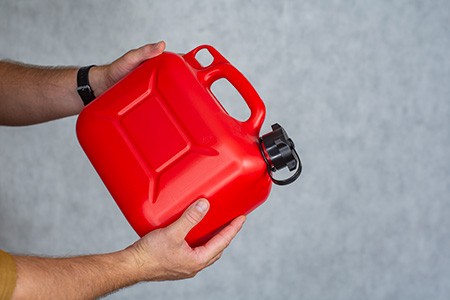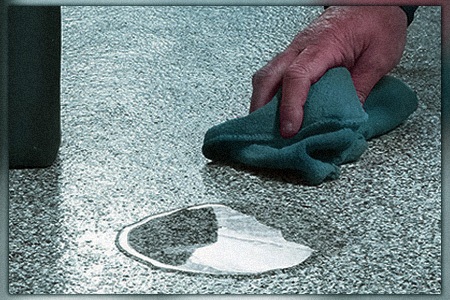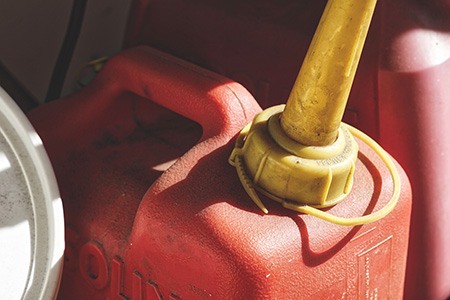How to Get Rid of a Gas Smell in Your House [4 Ways]
Author: Chris Miller | Editor: Omar Alonso
Review & Research: Jen Worst & Chris Miller

Have you spilled gasoline in your home? Maybe you were carrying it to fuel the generator outside and accidentally spilled some on the carpet. Great. Now the whole house smells like gas, and you're starting to feel lightheaded. No worries, we'll tell you how to get rid of a gas smell in your house.
Gas smells when spilled due to the benzene and other aromatic hydrocarbons in the fuel "gassing off" into the air. Hydrocarbons evaporate quickly, changing from a liquid state to a gaseous state in a matter of seconds. As a result, you smell its presence in the air.
Spilling gasoline in your home presents a fire and safety hazard. Extended exposure to aromatic hydrocarbons, like benzene, can damage your health. So, how to get rid of the gas smell in house environments without causing a fire or harming yourself?
What Are the Health Concerns of Exposure to Gasoline Fumes?
In recent years, gasoline distillates produced at refineries saw significant reductions in benzene used to make the fuel. However, benzene remains one of the top 20 most-used hydrocarbons in the United States.
We can absorb gas and benzene through skin contact with the chemical or by breathing in the fumes. In the case of a spill, it's most common that you'll end up breathing in the aerosolized hydrocarbon. Even limited exposure to gasoline fumes can cause irritation of the eyes, sinuses, throat, and skin.
Extended exposure to gas fumes can lead to severe adverse interactions with the central nervous system, leading to confusion, dizziness, headaches, drowsiness, tremors, and unconsciousness. The longer you wait to clean up the gas spill, the more exposure you have to the fumes, and the greater your chances of experiencing a severe adverse event.
Safety Hazards Involved With Cleaning Gasoline Spills

Before cleaning up the gas spill, you'll need to have a plan. Soaking up pools of gasoline means you'll have rags soaked in the stuff, presenting a fire hazard. You'll need to properly dispose of the materials used in the cleanup, don't just dump them into the trash.
Your state or city might have specific bylaws surrounding the disposal of contaminated materials. Call them for guidelines. During the cleanup, you'll also need to protect yourself from skin and aerosol exposure to gasoline and fumes. Ensure you have the correct PPE on hand to limit exposure. Use eye protection, gloves, and a respirator when cleaning the spill.
How to Get Rid of a Gas Smell in Your House – 4 Strategies
Here are four strategies to help you clean up a gas spill and remove the fumes from your home.
1) Eliminate the Fumes
The fumes from gasoline spills are the biggest health concern after an incident. Before you start cleaning, open all the windows and doors in the home. Doing so increases airflow in the rooms, pushing the fumes outdoors. The gas fumes rise to the ceiling, and they're looking to escape the room into the atmosphere outside.
Don't turn on ceiling fans or floor fans. Even the smallest spark from a fan's electrical circuit could be enough to ignite the fumes and start a fire. Go around the house and turn off all the electrical outlets, starting in the room with the spill. Don't pull any plugs from the sockets, as they might cause a spark.
If there's more than one person in the house, have them waft the door to the room back and forth to increase airflow in the room. Removing the fumes is important, but you'll need to clean up the spill and decontaminate the area to ensure that no more fumes enter the air inside the room.
2) Cleaning Gasoline Spills

After ventilating the spill area, it's time to clean up the spilled gasoline. The bigger the spill, the more fumes are created as the hydrocarbons gas off into the air. Get old rags or towels and soak up as much of the gasoline as possible. After saturating a rag or towel, toss it in a plastic garbage bag.
If there's a heavy spill, wring the rag into a bucket to remove excess gasoline before tossing it in the bag. If you spilled gas on a tiled surface, use a mop to soak it up. Rags are the best choice for spills on carpets.
If you spill gas on furniture, take the contaminated items outside and let them gas off in a shady area away from the house. Spills on carpets are the hardest to clean up properly. The gasoline penetrates the fibers of the carpet and the underfelt. As a result, the gas smell could linger for days.
After soaking up as much gas as possible, use wet rags to wash the carpet fibers as best you can. After the carpet dries, use a wet-dry vacuum cleaner to clean the carpet using carpet cleaner chemicals. This strategy should be sufficient to remove all presence of gasoline from the carpet fibers and underfelt.
Take the bag of gas-soaked rags outside and wash them in a bucket with soapy water. Hang the rags out to dry. If you have any spilled gas from wringing out the rags, transfer it to a steel container, like a jerry can. Call your council for information on the safe disposal of the collected gas and bucket wash water, don't just pour it down the drain.
3) Cleaning Spills in Garages & Sheds

If you have a gas-powered mower or other gas-powered machinery or appliances in the garage, chances are you fill them up before use. If you have a spill in the garage or shed, it's not as life-threatening as a spill in the home. However, it still requires some level of cleanup and decontamination to prevent fire and health hazards. Let's talk again about how to get rid of a gas smell in your house or garage.
As with the first strategy for dealing with a spill, the first task is ventilating the garage area. Open the garage or shed doors and windows to allow the fumes to escape. Remove any contaminated items from the garage or shed and place them outdoors in a shady spot to gas off.
If it's a warm day out and you spill gasoline on a concrete floor in the garage, you'll notice it evaporates pretty fast, leaving a faint outline around the spill area. Use some kind of mop to clean up the contaminated area, which should be sufficient.
If it's cold outside, you'll need to soak up the gasoline using the guidelines in the previous strategy. Remember to handle any waste gas collected safely. If waste gas is collected in a bucket, don't use it in your lawnmower, trimmer, or other gas-powered machinery.
The contaminants like dirt collected in the gas will clog the fuel system and the carburetor, requiring you to service them. Leave the doors to the garage or shed open overnight to allow the gas fumes to evaporate.
4) Removing Burned Gasoline Fumes
If you run a generator at home during a blackout, you might forget to close the windows and doors of nearby rooms. As a result, the burned gas fumes might enter the room and contaminate the air. If you have a room smelling of exhaust fumes, follow the guidelines to ventilate the area.
Depending on the extent of the contamination, it could take several hours, maybe an entire day, to rehabilitate the area. If there's furniture in the room, take it outside and air it out for a few hours before returning it to the room.
You can run fans in the room to improve ventilation and fast-track removing odors. Exhaust fumes don't present the same fire hazard as fresh spills.
FAQs Concerning a Gasoline Smell in Your House

Let’s cover some extra questions that tend to arise when you have the smell of gasoline in your house and want to know how to get rid of it and the possible effects on your health.
How Long Does it Take Gasoline Odors to Dissipate?
It can take several hours to remove the smell of fresh gas fumes or exhaust fumes from your home. The time it takes to decontaminate the air inside the house depends on the extent of the spill. As a general guideline, it should take around two days to a week to eliminate all signs of fumes from fresh gas spills, provided you decontaminate the area effectively.
What Happens if You Get Overexposure to Gasoline Fumes?
If you experience overexposure to gasoline fumes, you'll notice symptoms like headaches, nausea, fatigue, and sometimes, loss of consciousness. You'll also experience irritation of the eyes, sinuses, and skin.
How Do You Treat Overexposure to Gasoline Fumes?
The priority is to get outside into the fresh air as soon as possible when noticing signs of overexposure to gas fumes. In severe cases of overexposure, the affected individual may require hospitalization and treatment with oxygen to clear the bloodstream of hydrocarbons.
Key Takeaways Regarding Gasoline Fumes in Your House

Let’s recap the main points above regarding a gasoline smell in your house and what to do about it:
- If you have a spill indoors, the first priority is ventilating the contaminated area. Open all the doors and windows to bring fresh air in and allow the fumes to escape.
- Turn off all electrical appliances, and don't run fans; they may cause fires or explosions.
- Soak up spills using old rags or any types of towels on hand and wash them afterward.
- Call your council for directions on the safe disposal of contaminated items and spilled gasoline.
- If you're dealing with exhaust fumes in the home, ventilate the area and tun fans to fast-track air decontamination.
When it comes to how to get a gasoline smell out of your house (or a burning plastic smell in your house, etc.), the two keys are ventilation and removal of any excess gasoline liquid. It will dry up and not be in the air, though you will need to go through the process of cleaning the material that was touched by the gas, whether that’s carpeting or concrete.
That’s How to Get Rid of a Gas Smell in Your House
You should immediately create ventilation in the area where the gasoline spill occurred and then remove yourself until you have proper PPE available to use. Then you should clean the spill, removing as much excess liquid as possible.
Soon the room will become safe to enter and you can then work on cleaning the localized smell now that it’s no longer all throughout your house. That’s how to get rid of a gas smell in your house, in short.



